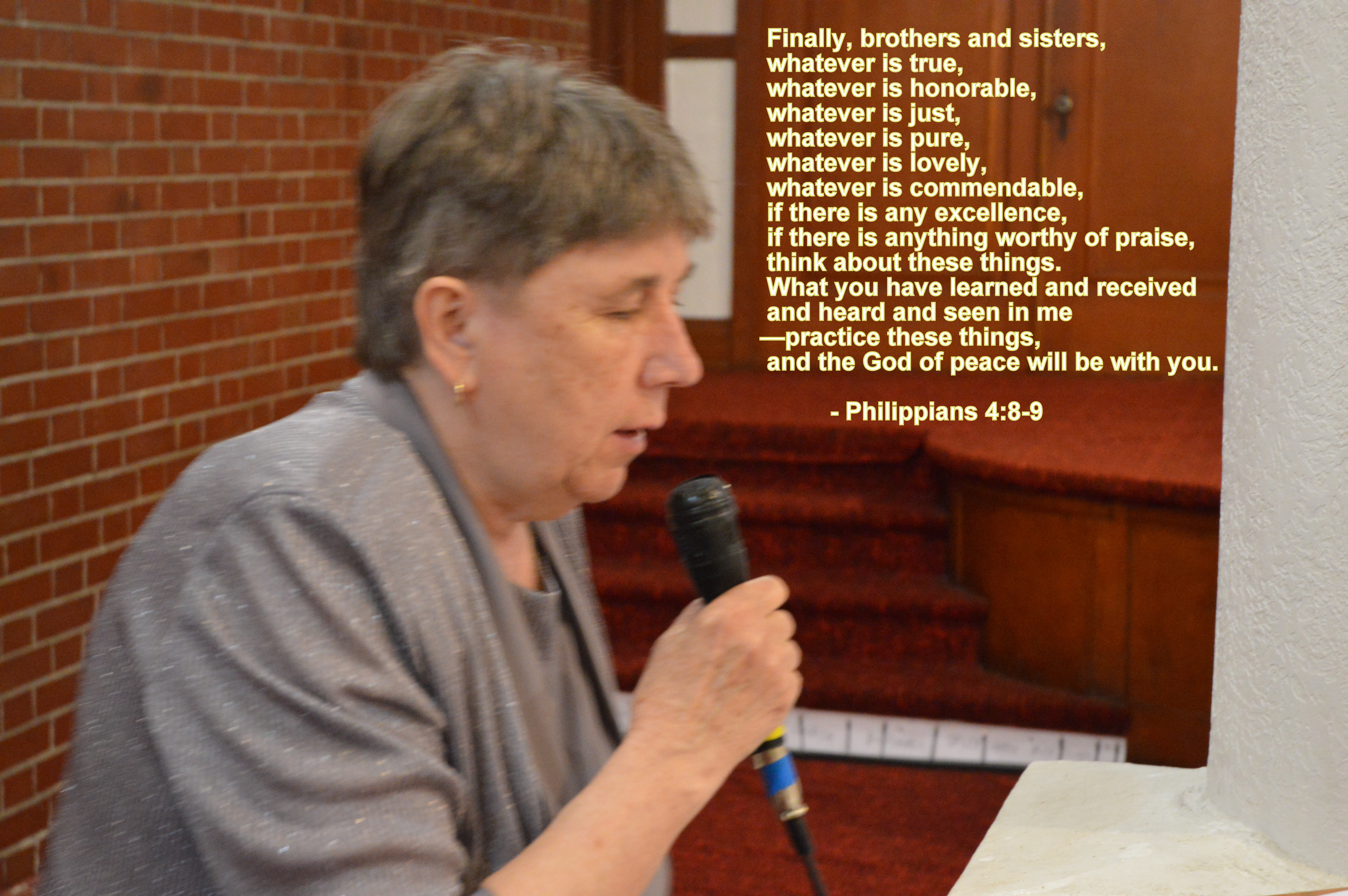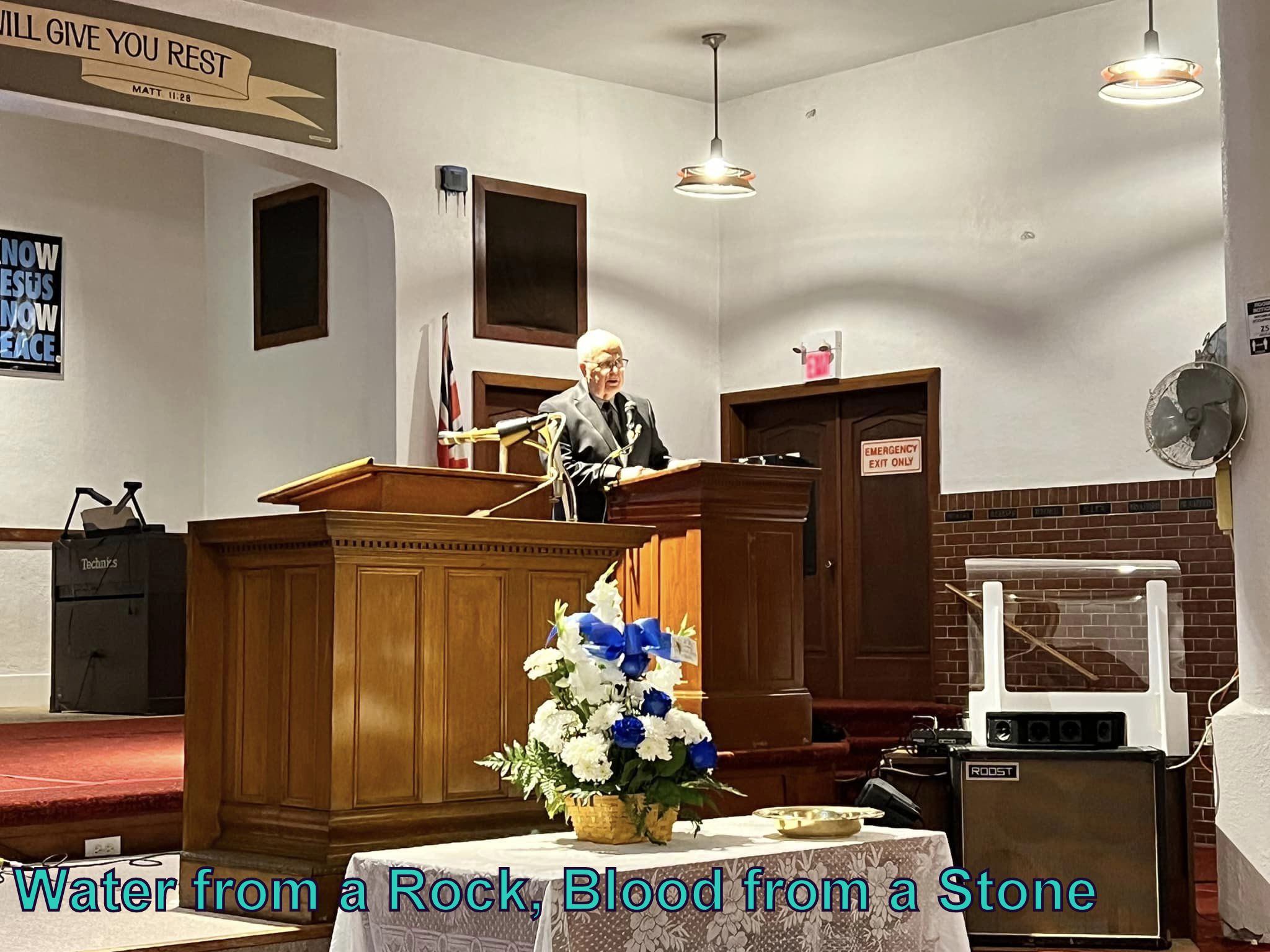
Bloor Lansdowne Christian Fellowship – BLCF Church, 1307 Bloor Street West, Toronto, ON.
Message for Sunday: Water from a Rock, Blood from a Stone
© June 2, 2024, by Steve Mickelson
Based on Messages Shared with BLCF on July 23, 2023, July 25, 2021,
September 2, 2018, and October 9, 2011
BLCF Bulletin September 2, 2018
BLCF Bulletin October 9, 2011 Bulletin
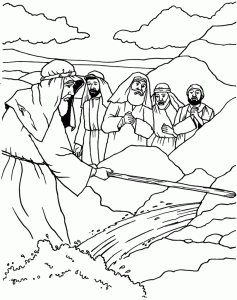
Announcements and Call to Worship; Prayer
Prayers and Tithing Hymn #572: Praise God from Whom All Blessings
Doxology (Praise God From Whom All Blessings Flow) – Instrumental – https://youtu.be/Mk4p3rihONU
Music Special: I, the Lord of Sea and Sky (Here I Am Lord ) – Lyrics – Chris Bray – https://youtu.be/4t6mz8yoocY
Music Special: Laura Story – Mighty To Save (Official Lyric Video) – https://youtu.be/W1jmqVU4RDo
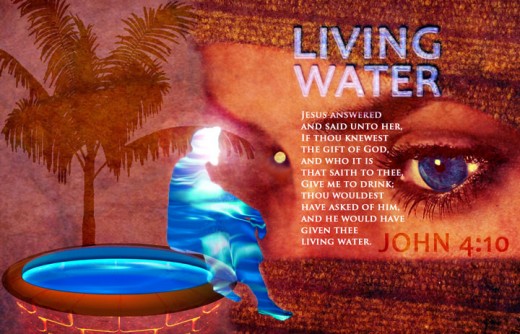
Responsive Reading #606: (Blessings from God – Psalm 103)
Message by Steve Mickelson: Water from a Rock, Blood from a Stone
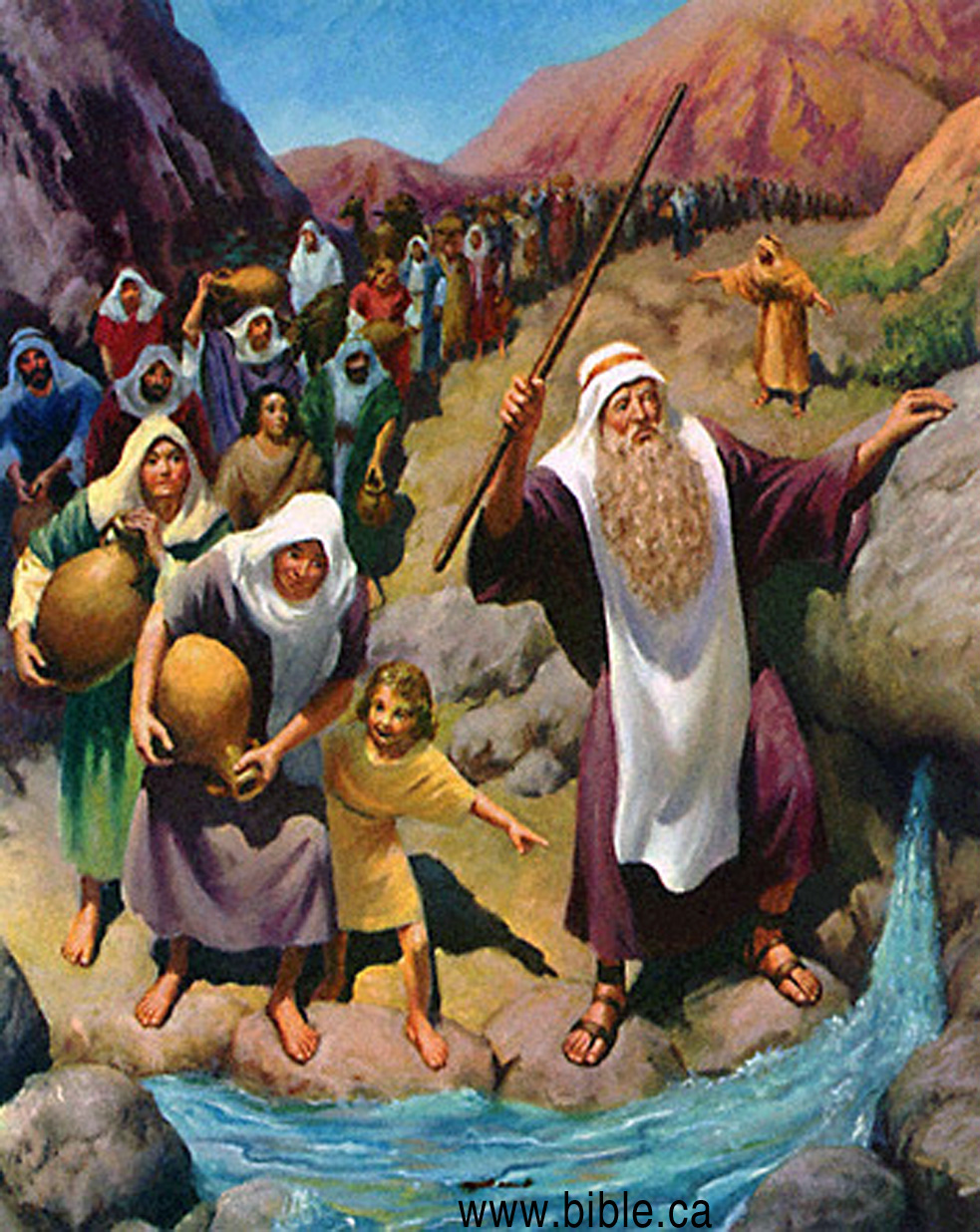
Let us pray…
Welcome to Bloor Lansdowne Christian Fellowship’s Sunday Praise and Worship Service for the first Sunday of June, which means that it is a Communion Sunday here at BLCF.
Our lesson this week is entitled Water from a Rock, Blood from a Stone, where we will examine ways in which people choose to acknowledge and sometimes forget to acknowledge the love and sacrifice the Lord has made on our behalf.
One way we have an opportunity here at BLCF Church, to acknowledge the Lord is by way of participating in Communion. On the first Sunday of every month, we give thanks to the Lord’s gifts of Salvation, Sanctification, and the Holy Spirit by partaking in the elements of communion. This leads us to the following questions:
What does the Bible indicate about the importance of giving thanks to God? And how do we as believers in the Resurrected Christ deal with discord from within the body? The following Scripture is taken from the 12th Book of the New Testament, which is Colossians 3:15-17 (ESV):
And let the peace of Christ rule in your hearts, to which indeed you were called in one body. And be thankful. Let the word of Christ dwell in you richly, teaching and admonishing one another in all wisdom, singing psalms and hymns and spiritual songs, with thankfulness in your hearts to God. And whatever you do, in word or deed, do everything in the name of the Lord Jesus, giving thanks to God the Father through him.
The above scripture is attributed to have been authored by Paul, formerly known as Saul of Tarsus, to the church in Colossians, so named for being located within Colossae. Colossae is in the region of the seven churches of Revelation 1-3. In Colossians 4:13 there is mention of local brethren in Colossae, Laodicea, and Hierapolis. Colossae was approximately 12 miles from Laodicea and 14 miles from Hierapolis. Members of the congregation at Colossae had incorporated pagan elements into their practice, including the worship of elemental spirits.
The Epistle to the Colossians declares Christ’s supremacy over the entire created universe and exhorts Christians to lead godly lives. The letter consists of two parts: first a doctrinal section, then a second regarding our conduct. In both sections, false teachers who have been spreading terror in the congregation are opposed. But just we find in Biblical times, as today, some people conduct their worship or faith practices incorporating pagan beliefs. In time the worship ignores and forsakes our Lord.
And what is the Lord’s view of such pagan observances? We read in Nehemiah 9:1-3; 15-17: (ESV):
The People of Israel Confess Their Sin
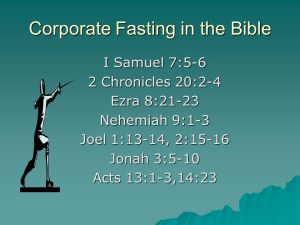
Now on the twenty-fourth day of this month, the people of Israel were assembled with fasting and in sackcloth, and with earth on their heads. And the Israelites separated themselves from all foreigners and stood and confessed their sins and the iniquities of their fathers. And they stood up in their place and read from the Book of the Law of the LORD their God for a quarter of the day
You gave them bread from heaven for their hunger and brought water for them out of the rock for their thirst, and you told them to go in to possess the land that you had sworn to give them.
“But they and our fathers acted presumptuously and stiffened their neck and did not obey your commandments. 17They refused to obey and were not mindful of the wonders that you performed among them, but they stiffened their neck and appointed a leader to return to their slavery in Egypt. But you are a God ready to forgive, gracious and merciful, slow to anger and abounding in steadfast love, and did not forsake them.
The key part about this scripture is that despite their sins, that some refused to obey God’s Laws or even to acknowledge what the Lord had provided for his people, God’s love remained steadfast. He is a God ready to forgive, gracious and merciful, and slow to anger, despite our sinful, ungrateful tendencies.
Colossians 3:17 – And whatever you do, in word or deed, do everything in the name of the Lord Jesus, giving thanks to God the Father through him.
Many in today’s society seem to have found themselves wandering in the wilderness, stiffening their necks to their Lord as had happened in the time of Moses, in Exodus 17:1-7 (ESV):
Water from the Rock

All the congregation of the people of Israel moved on from the wilderness of Sin by stages, according to the commandment of the LORD, and camped at Rephidim, but there was no water for the people to drink. Therefore the people quarreled with Moses and said, “Give us water to drink.” And Moses said to them, “Why do you quarrel with me? Why do you test the LORD?” But the people thirsted there for water, and the people grumbled against Moses and said, “Why did you bring us up out of Egypt, to kill us and our children and our livestock with thirst?”
So Moses cried to the LORD, “What shall I do with this people? They are almost ready to stone me.” And the LORD said to Moses, “Pass on before the people, taking with you some of the elders of Israel, and take in your hand the staff with which you struck the Nile, and go. Behold, I will stand before you there on the rock at Horeb, and you shall strike the rock, and water shall come out of it, and the people will drink.”
And Moses did so, in the sight of the elders of Israel. And he called the name of the place Massah and Meribah, because of the quarreling of the people of Israel, and because they tested the LORD by saying, “Is the LORD among us or not?”
It is sad to see that as a reminder of the people’s ungrateful attitude, Moses saw fit to name this spring of water created by the Lord as Massah and Meribah, which are translated as Testing and Quarreling.
1 Corinthians 10:1 – Warning Against Idolatry
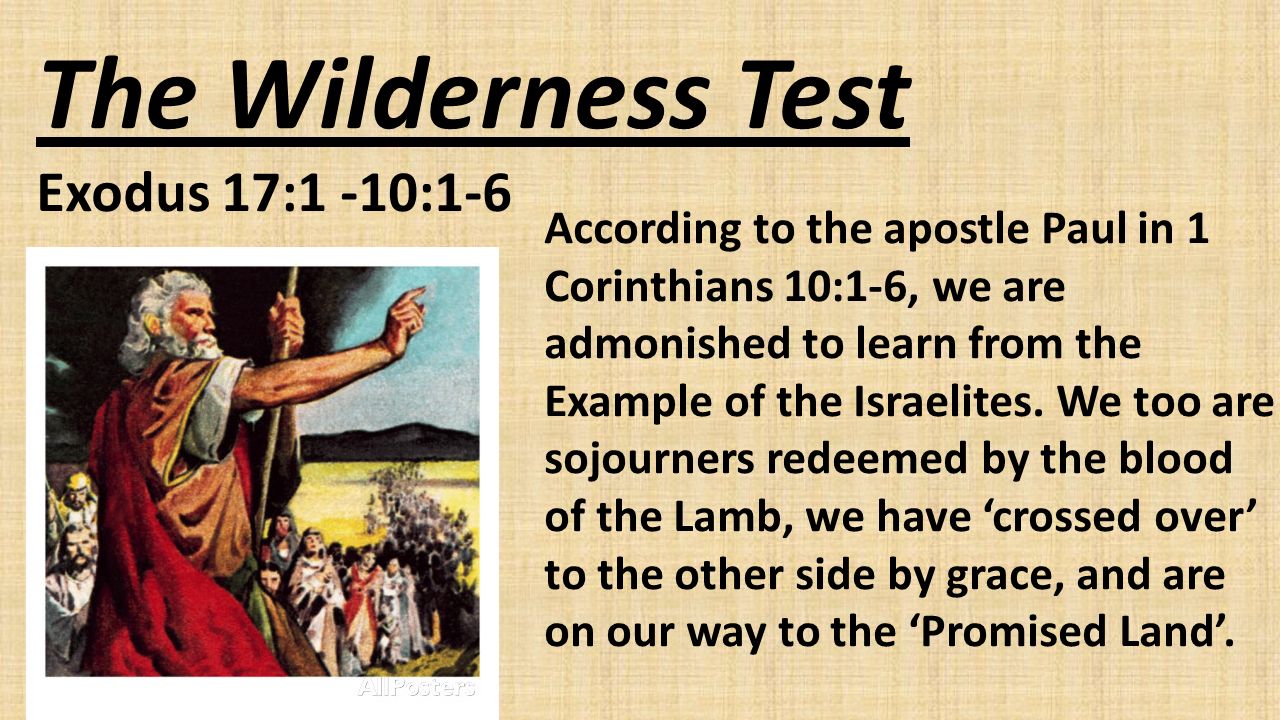
10 For I do not want you to be unaware, brothers and sisters, that our fathers were all under the cloud, and all passed through the sea, 2 and all were baptized into Moses in the cloud and in the sea, 3 and all ate the same spiritual food, 4 and all drank the same spiritual drink. For they drank from the spiritual Rock that followed them, and the Rock was Christ. 5 Nevertheless, with most of them God was not pleased, for they were overthrown in the wilderness.
We often find ourselves in a place where instead of counting our blessings, we end up creating a litany of complaints and criticisms.

I remember some years ago, as a young man, new to the Christian faith, I attended a church meeting. The associate Church Pastor had taken great pains to prepare coffee for those in attendance. When offered a cup, I not only said no thank you, saying that “I am all ‘coffeed-out’ and that I should not be drinking so much coffee”, to which several others in attendance acknowledged the same. By adding those remarks, I had made the Pastor’s efforts appear to be something worthy of complaint, instead of just an act of love and kindness to others.
It was only some years later that I had the opportunity to really understand how we can harm others with our casual comments.
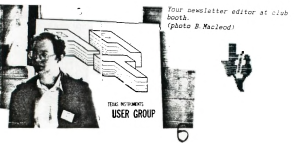
For several years, as President of a local computer club, (9T9 Users Group for the Texas Instruments TI-99/4A Home Computer), I also edited the club’s newsletter which consisted of 20 pages per issue, with ten issues a year. In those days, computer technology lacked high-resolution scanners and word recognition software. Since many of the articles we printed came from printed articles from other clubs with whom we exchanged newsletters, and the newsletters were not in electronic form, we either had to transcribe articles, a difficult task for this two-finger typist, or photocopy, cut and paste master copies for the local photocopy shop. Needless to say, I chose the latter. Still, the process of producing 20 pages of a newsletter, which included a page or two outlining the club’s activities in my own bi-line translated into 8-10 hours of labour effort every month.
You can imagine my feelings when I proudly presented the new issue of the newsletter, in which one or two members, instead of acknowledging many hours of effort, seemed to take delight in obvious typos or spelling errors. Needless to say, after four years of what seemed to be a thankless job, I decided to step down as president and newsletter editor. But I have a good idea of how that Associate Pastor felt, as, after my remarks, he stopped making coffee for our church meetings. Yet, despite all our bickering and complaints, God still loves us. He has not given up on us. Now that is something for which we may be thankful.
With a little faith, Moses produced water from a rock and was grateful for God’s work, which is for some people, like getting blood from a stone. That is why we all should obey God’s law as described in Matthew 22:36-40 (ESV):
“Teacher, which is the great commandment in the Law?” And he said to him, “You shall love the Lord your God with all your heart and with all your soul and with all your mind. This is the great first commandment. And a second is like it: You shall love your neighbour as yourself. On these two commandments depend all the Law and the Prophets.”
And as far as the internal bickering and strife, which can still occur amongst Christians, the Apostle Paul minds how two members of the Church of Phillipi should deal with a mutual disagreement, in Philippians 4:1-9 (ESV):
Exhortation, Encouragement, and Prayer for Euodia and Syntyche

4 Therefore, my brothers and sisters, whom I love and long for, my joy and crown, stand firm thus in the Lord, my beloved.
2 I entreat Euodia and I entreat Syntyche to agree in the Lord. 3 Yes, I ask you also, true companion,[a] help these women, who have labored side by side with me in the gospel together with Clement and the rest of my fellow workers, whose names are in the book of life.
4 Rejoice in the Lord always; again I will say, rejoice. 5 Let your reasonableness be known to everyone. The Lord is at hand; 6 do not be anxious about anything, but in everything by prayer and supplication with thanksgiving let your requests be made known to God. 7 And the peace of God, which surpasses all understanding, will guard your hearts and your minds in Christ Jesus.
8 Finally, brothers and sisters, whatever is true, whatever is honorable, whatever is just, whatever is pure, whatever is lovely, whatever is commendable, if there is any excellence, if there is anything worthy of praise, think about these things. 9 What you have learned and received and heard and seen in me—practice these things, and the God of peace will be with you.
The true companion or helper described by Paul is most likely the Holy Spirit, as described in John 14:
John 14:25-26 ESV)
25 “These things I have spoken to you while I am still with you. 26 But the Helper, the Holy Spirit, whom the Father will send in my name, he will teach you all things and bring to your remembrance all that I have said to you.
At this time, let us acknowledge what the Lord has given us, by partaking in the elements of Communion.
Communion

Communion Music Special – Lauren Daigle – “We Will Not Forget” (Lyric Video) – https://youtu.be/izeZa9wx8wA?si=oNXu2rGTLWiZ_NwL
Have you ever wondered why we partake in communion?
Communion celebrates the Gospel: Jesus was broken for us so that we can be fixed by Him.
Celebrating communion marks the story of Jesus, how He gave Himself completely to give us a better life, a new start, and a fresh relationship with God (1 Peter 3:18). It’s not about a ritual to revere, but a person to worship. Jesus is less concerned about the method of celebrating communion and more concerned that we celebrate it.
As often as we remember Jesus, we should celebrate Jesus.
Communion is important because it’s a command to remember. Jesus wants us to remember every time we taste bread and wine, and even when we sit at the tables in our own homes, that He is the one who provides all we need. He gives us the physical food that we need to survive and the spiritual nourishment we need to keep taking our next steps with Him.
https://newspring.cc/articles/what-is-communion-and-why-do-we-do-it
Communion – An Act of Fellowship and Demonstration of Our Faith:
1 John 1:3 (ESV): Fellowship
3 that which we have seen and heard we proclaim also to you, so that you too may have fellowship with us; and indeed our fellowship is with the Father and with his Son Jesus Christ.
Communion began on the annual celebration of Passover Supper when Jesus told his disciples to remember his sacrifice as they ate the bread and drank the wine.
Just as Israel celebrates the sacrifice of the Passover lamb, when the angel of death passed over their homes, so believers in Jesus celebrate and remember his sacrifice for the judgment of all of our sins when he died on the cross.
Communion uses bread as a symbol of his body and juice as a symbol of his blood. The act of taking communion does not save us, it is an act of worship and remembrance of our Lord, who instructed his followers to continue, until the day he returns.
Luke 22:14-20 (ESV): Institution of the Lord’s Supper
14 And when the hour came, he reclined at table, and the apostles with him. 15 And he said to them, “I have earnestly desired to eat this Passover with you before I suffer. 16 For I tell you I will not eat it[a] until it is fulfilled in the kingdom of God.” 17 And he took a cup, and when he had given thanks he said, “Take this, and divide it among yourselves.18 For I tell you that from now on I will not drink of the fruit of the vine until the kingdom of God comes.” 19 And he took bread, and when he had given thanks, he broke it and gave it to them, saying, “This is my body, which is given for you. Do this in remembrance of me.” 20 And likewise the cup after they had eaten, saying, “This cup that is poured out for you is the new covenant in my blood.
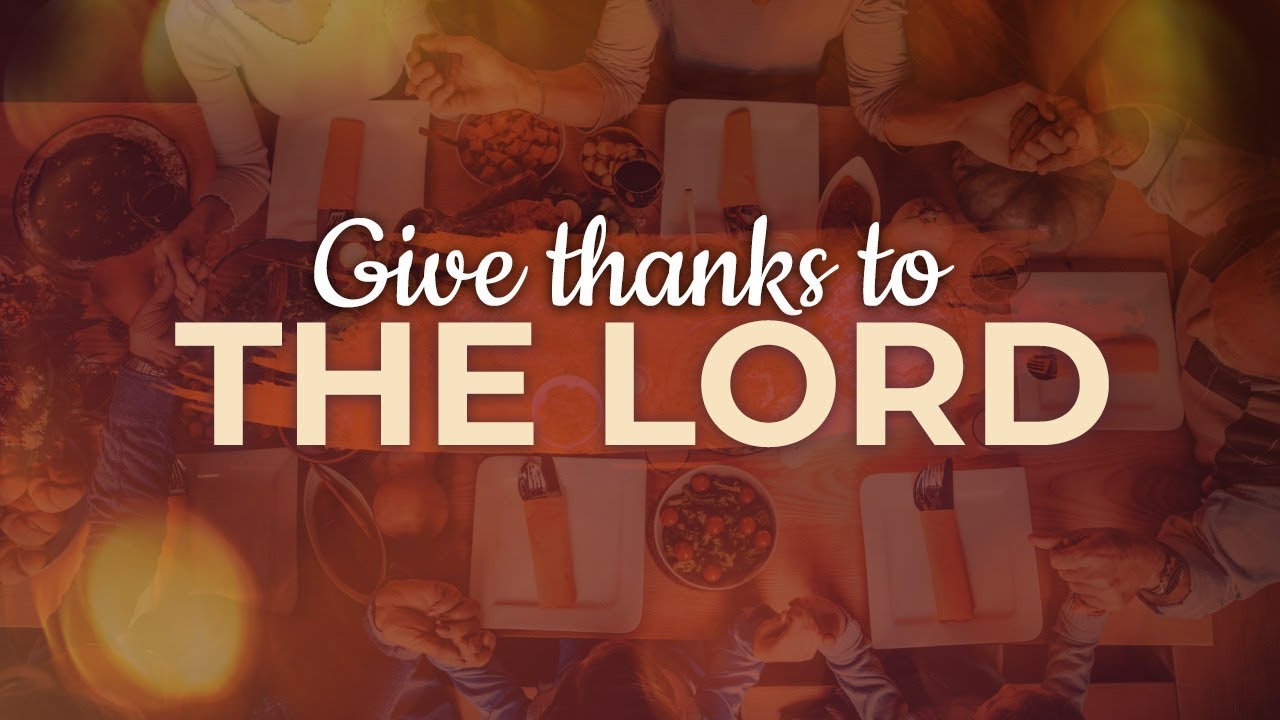
Let us conclude today’s lesson by taking to heart a demonstration of our gratitude to both our Lord, as well as our neighbours as expressed by David in 1 Chronicles 16:8-12:
David’s Song of Thanks
8 Oh give thanks to the Lord; call upon his name;
make known his deeds among the peoples!
9 Sing to him, sing praises to him;
tell of all his wondrous works!
10 Glory in his holy name;
let the hearts of those who seek the Lord rejoice!
11 Seek the Lord and his strength;
seek his presence continually!
12 Remember the wondrous works that he has done,
his miracles and the judgments he uttered,
Let us pray…
Music Special: I Will Sing to the Lord (Song of Moses and Miriam, Horse & Rider) – Exodus 15 Music by Danette Granger – https://youtu.be/4ZeJQGzm230
Benediction Music Special: In Jesus’ Name (God of Possible) – Katy Nichole – Lyric Video – https://youtu.be/R84PqRdZ7_Y
Benediction – (Philippians 4:8-9): Finally, brothers and sisters, whatever is true, whatever is honorable, whatever is just, whatever is pure, whatever is lovely, whatever is commendable, if there is any excellence, if there is anything worthy of praise, think about these things. What you have learned and received and heard and seen in me—practice these things, and the God of peace will be with you.
